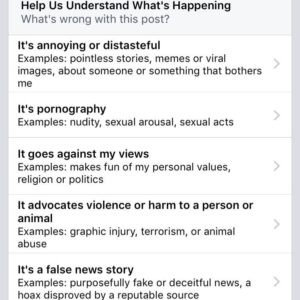- People who are not satisfied with the result of presidential elections accused Facebook that fake news affected the final result. Source: Reuters Top News Twitter https://twitter.com/Reuters/status/806650766618398720
- Mark Zuckerberg denies that fake news had a significant impact on the result of the U.S presidential elections. Source: Facebook Fever Twitter https://twitter.com/FeverFacebook/status/803388058741551104
- Facebook has already introduced a system that allows the users to report content that appears in the social network. Source: Nina KG Byzantine Twitter https://twitter.com/NinaByzantina/status/804807304260579328
By: Rafael Matuszczak
Facebook is planning on implementing systems that will prevent fake news from being spread throughout the social network, according to the company’s CEO, Mark Zuckerberg. The problem of fake news has been addressed after allegations that fake news presented on Facebook had an impact on the result of the 2016 U.S presidential elections.
Having 1.79 billion monthly users worldwide, Facebook is a powerful tool for spreading the news around the world. Nearly 44 percent of adults in the United States take Facebook as one of their main sources of information, according to variety.com.
Even though for some people the social network might seem to be an excellent tool to share the news with the people, Facebook’s popularity has also its downside. The main issue that is associated with sharing news online is that the information does not have to be verified by anybody, and it is possible that the news is misleading or even entirely fabricated.
The problem has emerged during the 2016 U.S presidential elections. During the election, people had a chance to read articles indicating that the pope endorsed Donald Trump or Bill Clinton raped a 13-year-old girl, according to vox.com. Those two articles, along with many others, contained information that was not true.
Because of such stories appearing on Facebook, some people started to criticize the company. Not only was the social network criticized for featuring fabricated news, but also for the list of recommended articles, according to variety.com.
Some people believe that the featured misleading information had a significant impact on the turnout of the presidential elections and Donald Trump’s victory. Nevertheless, Zuckerberg tried to fight the criticism insisting that it is not possible that people made their choice solely based on stories featured on Facebook.
“There is a certain profound lack of empathy in asserting that the only reason someone could have voted the way they did is they saw some fake news,” said Zuckerberg, according to vox.com.
He also indicated that if the allegations were true, the fake news would also affect Hillary Clinton’s campaign instead of helping Donald Trump only.
“Why would you think there would be fake news on one side and not the other?” added Zuckerberg.
Nonetheless, the problem of fake news remains an important issue as not everyone can distinguish between facts and fabricated information.
“I do understand concern for fake news because not everyone thinks critically and I see a lot of opinions based on Facebook”, said Jan Dahrendorff, a Saint Leo student majoring in psychology.
To address the issue, Facebook has announced that it will implement tools that will help to fight fake news according to money.cnn.com. So far, the company has introduced a survey system that asks
users to determine whether a header of an article is misleading or it relates to the information included in it, according to the blaze.com. Also, the company plans on implementing an algorithm-based system that will help to verify the information.
“Some of these ideas will work well, and some will not. We understand how important the issue is for our community and we are committed to getting this right,” said Zuckerberg, according to money.cnn.com.
Some people might be concerned whether Facebook’s plans on taking steps towards removing fake news from its social network does not compromise the freedom of speech. Apparently, under current regulations and the doctrine of the First Amendment, businesses, such as Facebook, cannot fully interfere the information that people share on the internet, according to Bloomberg.com.
On the other hand, in order to stop fabricated information from spreading, it might not have to be necessary to fully control what people share on the internet.
“I think you should be able to post anything on Facebook as long as you don’t offend people. You should be respectful,” said Dahrendorff.
Even though the systems might be helpful with fighting fake news, they will not stop people from believing in unverified information. Therefore, one of the most important aspects of fighting fabricated news might be to educate people how to distinguish between misleading and trustworthy information, as Dahrendoff suggested.
“It doesn’t bother me because it is sometimes funny and entertaining. Everyone should do their own research anyways and not blindly rely on the media and what’s on Facebook!” said Dahrendorff.
Also, gathering information from more than one source can help in shaping more informed opinions, as well.
“I think I can tell the difference because I try to consider multiple sources to verify the information,” added Dahrendorff.
Although education might be the key to stopping fake news from forming people’s opinions, Facebook appears to have the biggest fake news problem, according to vox.com. Therefore, the company’s idea to address the issue might be an important step towards making the social network more reliable source of information.








